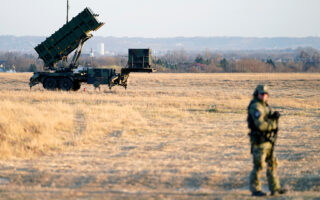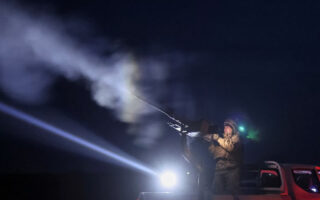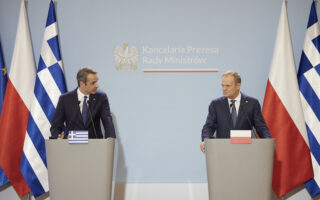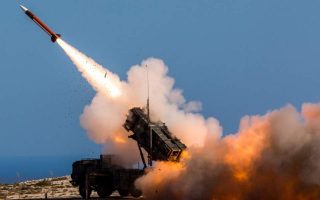Haggling over Greek aid to Ukraine
Transatlantic pressure over air defense systems – what Athens can’t give Kyiv

The protracted nature of the war in Ukraine and the signal sent a few days ago by the US Congress of the continued bipartisan commitment to Ukraine, with a substantial aid package, are putting pressure on Europeans to continue the flow of weapons systems and ammunition to Ukrainian forces.
The pressure is particularly intense, as was made clear at the last US-sponsored meeting (Ukraine Defense Contact Group) last Friday. Athens is under double pressure, both from Washington and from its European Union partners, especially Berlin, which believes that Greece has not yet provided what it should have in the context of transatlantic solidarity. An interesting element of the pressures on Athens is that none of Greece’s interlocutors believes that Ukrainian defense can wait until after the June 9 European elections. Any new delivery of a weapons system or munitions should be made immediately, as the war continues and Ukrainian defenses are shaken.
In a series of meetings held over the past several months, Prime Minister Kyriakos Mitsotakis has made it clear that Greece cannot make provisions that weaken the country’s air defenses. And Kyiv’s first request to Athens to strengthen Ukrainian air defenses was not made until just a few days after the Russian invasion, in February 2022.
The offer
Greek officials have recently been pointing out that the country is among those with the highest per capita supply of artillery ammunition to Ukraine. However, this argument is being questioned as outdated, as anti-aircraft systems are now Kyiv’s most pressing need.
The Ukrainians’ latest demands to Greece, besides spare parts and missiles for F-16 fighters and continued support for artillery, included anti-aircraft systems of Russian, and not only, manufacture, namely S-300, SA-8 OSA/AK, Crotale and Hawk, even if they have malfunctions or other problems. Tellingly, the Ukrainians’ wish-list does not include the Patriot anti-aircraft system, which Greece values as integral to its air defense; it was the Germans who demanded that Athens provide the missiles to Kyiv.
This demand comes as Spain is already in talks with its NATO partners about withdrawing a Patriot missile battery from Turkey, where it is currently stationed, to transfer to Ukraine. Spain’s offer is being used to up the pressure on Greece, arguing since that its ally Turkey also stands to lose anti-aircraft capability, it could make a similar move. The fact that Greece feels threatened by Turkey goes unmentioned, while the Spanish patriots are located in southeastern Turkey, far from Greece.
The stationing of a Hellenic Air Force Patriot battery in Saudi Arabia over the last two and a half years is also used as an argument to pressure Greece. Although not directly related, France’s request to Greece for an array of French-made Crotale missiles to boost its air defense during the Paris Olympics, which Greece cannot easily refuse, could set a precedent.
Even more intense is the pressure on Athens to provide systems built by former Warsaw Pact states. Some of the Soviet-made SA-8 OSA/AK systems fall into this category. Specifically, a battalion-strength of these systems was provided to Greece by the former East Germany just before its collapse and, certainly, Berlin would gladly provide the re-export license (i.e. the end-user license agreement) for the system to be sent to Ukraine. The main problem with the OSA/AK is that they form the backbone of the air defense for eastern Aegean islands. And in this case, Athens has naturally requested replacement systems to agree to the exports. Also, Greece’s EU and NATO partners are pushing for the export of systems purchased from the Russian Federation. It is obvious the latter will not provide the end-user license for Ukraine.
Ammunition
The third line of pressure, which Athens will find very difficult to resist for long, is to supply Ukraine with anti-aircraft missiles or missiles from its stockpile to use in systems already operating on the Ukraine war front. In short, Greece’s partners are asking for the separation of anti-aircraft systems from their ammunition, in an attempt to override Greek objections. It is not clear whether this can apply to long-range air defense systems, such as the Patriots, which are the linchpin in Greece’s anti-aircraft defense.





